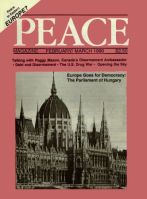
Peace Magazine Feb-Mar 1990, page 30. Some rights reserved.
Search for other articles by Edward Silva here
Richard Hudson (filmmaker)
MANY PEACE workers have wondered if the United Nations could somehow be made to work better in preventing wars. Richard Hudson was a journalist who reported on the U.N. for 20 years and has come up with a scheme that has attracted some interest and support. He is now Executive Director of the Center for War/Peace Studies in New York City; the Center distributes an informative 28-minute VHS video on his idea.
Hudson thinks the U.N. can become a world parliament, making global decisions on wars. The key notion is the adoption of a new three-part decision-making rule by all U.N. members. The nations would accept as "binding" decisions those resolutions that carried two-thirds of the General Assembly, when: (1) each nation had one vote (the present situation); (2) each nation is "weighted" by its population size; and (3) each nation is "weighted" by its monetary contribution to the U.N.
Two general decision limits obtain. First, the U.N. would never make decisions about any nation's internal affairs, but only its international ones. Second, the U.N. would not have military forces of its own. Doubts would be referred to the U.N.'s World Court for resolution.
The video presents "The Case for the Binding Triad" in clear, direct terms. It adds to the usual talking heads and voice-over graphics some footage from three weekend "mock U.N. sessions"
where the participants are actually from the diplomatic corps of U.N. members. These conferences are "trials" on how the new decision-making might go in "real life" and will warm the hearts of all who involve themselves in such issues.
The video ends with Hudson fielding a few of the tough questions raised by his scheme. This ending, of course, invites viewers to their own questions about the scheme. This, and its short length makes it a potentially useful tool for peace educators who want to stimulate thought about making the U.N. work better for peace. It will likely work well in classrooms and
community settings.
Professor Silva is a political sociologist, University of Toronto.

Peace Magazine Feb-Mar 1990, page 30. Some rights reserved.
Search for other articles by Edward Silva here